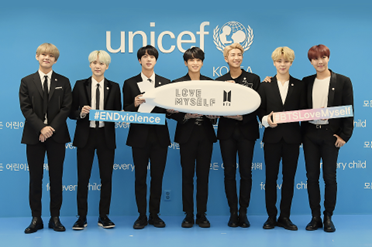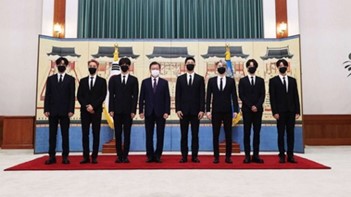 Hearing the word “K-Pop star” undoubtedly causes many entertaining and exciting images to come to mind. A group of people moving almost as one body as they execute perfect and precise dance moves, the smooth and melodic vocals blended with fast and coarse rap, all done in Korean, of course. The charismatic smiles and joking mannerisms that can be seen on variety shows and interviews. All of these are what most people have come to associate with the role of a K-Pop idol.
Hearing the word “K-Pop star” undoubtedly causes many entertaining and exciting images to come to mind. A group of people moving almost as one body as they execute perfect and precise dance moves, the smooth and melodic vocals blended with fast and coarse rap, all done in Korean, of course. The charismatic smiles and joking mannerisms that can be seen on variety shows and interviews. All of these are what most people have come to associate with the role of a K-Pop idol.
But could anyone ever have predicted that such a performer would make their way all the way to the United States White House?
By this point, I don’t even think a formal introduction is necessary when I say the name BTS. They have gone on to become one of the most recognized Korean music groups all around the world, spreading positive messages through their music and performances. They went on to break into the American music industry in 2017, when their album Love Yourself: Her debuted at No. 7 on the Billboard 200, the highest debut for any K-Pop act. Since then, they have had multiple songs soar to No. 1 on the Billboard Hot 100, have done countless performances on various American talk shows, and have attended the “Big Three” American music awards shows (American Music Awards, Grammys, Billboard Music Awards) as performers, nominees and winners. As far as music goes, they have continued to climb higher with no end in sight.
Of course, going on to win awards and perform for all types of people in the most diverse of venues is an honor in itself to these seven people who have dedicated their lives to their love for music and performing. But BTS have also taken the initiative to go one step further and use their influence and popular status to spread and advocate on the behalf of the causes they truly hold dear to them. It started with their LOVE MYSELF and #ENDViolence campaign in 2017, a project created in collaboration with UNICEF to raise awareness of and fight against violence towards children and teenagers all around the world.

The following year, BTS would go on to spread their message of self love and love for others at the 73rd United Nations General Assembly, with leader RM delivering a moving speech regarding his own humble beginnings and his journey towards self love. This was a monumental day not only for BTS, but for youth all around the world, who were being given a voice through these seven men from the Republic of Korea and their message of love. BTS would then go on to speak yet again at the 75th General Assembly, delivering their message virtually while in the midst of the COVID-19 pandemic.

BTS at the 2018 United Nations General Assembly
In 2021, the seven young men would once again go far beyond their roles as musicians and performers, being appointed the prestigious title of Special Presidential Envoy for Future Generations and Culture by former president Moon Jae-in and going on to accompany the president to the 76th UN General Assembly. This time, the group would be speaking in front of the assembly with the goal to “raise awareness on global agendas, such as sustainable development, to future generations and to strengthen the nation’s diplomatic power across the world in line with South Korea’s elevated status in the International community,” according to a spokesperson from the South Korean Presidential Office.

BTS with former president Moon Jae-in as they officially receive their title of Special Presidential Envoy for Future Generations and Culture
And on May 31, 2022, the septet made yet another journey to the United States after having received an invitation from US president Joe Biden himself, traveling just for one day to speak at an official press briefing and directly with the president about the issue of hate crimes targeting Asians, as well as to celebrate the final day of AANHPI (Asian American, Native Hawaiian, and Pacific Islander) Heritage Month.
While hate crimes and violence targeting the AANHPI community in the US is certainly not a new phenomenon, there has been an unprecedented surge in such crimes happening ever since the beginning of the COVID-19 pandemic. The Atlanta spa shooting that ended in the death of eight people, six of whom were women of Asian descent, is one of the tragedies that brought this issue to the forefront of headlines and sparked the “Stop Asian Hate” movement. In response to these heinous crimes, President Biden signed the COVID-19 Hate Crimes Act, a public law that is described as the following:
- This bill requires a designated officer or employee of the Department of Justice (DOJ) to facilitate the expedited review of hate crimes and reports of hate crimes.
- DOJ must issue guidance for state, local, and tribal law enforcement agencies on establishing online hate crime reporting processes, collecting data disaggregated by protected characteristic (e.g., race or national origin), and expanding education campaigns.
- Additionally, DOJ and the Department of Health and Human Services must issue guidance aimed at raising awareness of hate crimes during the COVID-19 (i.e., coronavirus disease 2019) pandemic.
- The bill establishes grants for states to create state-run hate crimes reporting hotlines. It also authorizes grants for states and local governments to implement the National Incident-Based Reporting System and to conduct law enforcement activities or crime reduction programs to prevent, address, or respond to hate crimes.
- Finally, in the case of an individual convicted of a hate crime offense and placed on supervised release, the bill allows a court to order that the individual participate in educational classes or community service as a condition of supervised release.
Aside from official action taken by the US government, people all across the country raised their voices through protests and campaigns both online and offline, expressing their anger, frustration, and despair in witnessing such tragedies happen again and again, but also voicing their hope for change and fiercely pushing for the eradication of such crimes within the US and across the entire world.
BTS did not stay silent on the matter, posting an official statement on their Twitter account expressing their grief and anger towards the matter, as well as their condemnation of racism and racial violence. Their statement was as follows:
“We send our deepest condolences to those who have lost their loved ones. We feel grief and anger.
We recall moments when we faced discrimination as Asians. We have endured expletives without reason and were mocked for the way we look. We were even asked why Asians spoke English.
We cannot put into words the pain of becoming the subject of hatred and violence for such a reason. Our own experiences are inconsequential compared to the events that have occured over the past few weeks. But these experiences were enough to make us feel powerless and chip away our self-esteem.
What is happening right now cannot be dissociated from our identity as Asians. It required considerable time for us to discuss this carefully and we contemplated deeply on how we should voice our message.
But what our voice must convey is clear.
We stand against racial discrimination. We condemn violence. You, I and we all have the right to be respected. We will stand together.”
During the official press briefing at the White House, BTS were once again given the opportunity to voice their rejection of such hatred and violence, making the following statements.
 Jimin: We were devastated by the recent surge of hate crimes, including Asian American hate crimes. To put a stop on this and support the cause, we’d like to take this opportunity to voice ourselves once again.
Jimin: We were devastated by the recent surge of hate crimes, including Asian American hate crimes. To put a stop on this and support the cause, we’d like to take this opportunity to voice ourselves once again.- Jungkook: We still feel surprised that music created by South Korean artists reaches so many people around the world, transcending languages and cultural barriers. We believe music is always an amazing and wonderful unifier of all things.
- Suga: It’s not wrong to be different. I think equality begins when we open up and embrace all of our differences.
- V: Everyone has their own history. We hope today is one step forward to respecting and understanding each and every one as a valuable person.
So what exactly is the significance of all of this? Inviting celebrities to the White House is nothing new, and as I explained above, BTS has been in the public eye speaking out about all sorts of issues for the last five years. So what makes this appearance at the White House so monumental?
In terms of my own personal opinion, I cannot stress enough how much significance this holds for the Asian community in terms of representation and recognition. Some may argue that BTS, as native-born Koreans who did not grow up and live in the US, do not understand the exact situation the AANHPI community faces, but the fact of the matter is that they have experienced instances of racism, both within the music industry and other parts of their lives. Our situations do not need to be exactly identical in order for us to voice our condemnation of racism and racial violence and to come together in order to fight against such issues.
What’s more, in speaking up on the issue and participating in the celebration of AANHPI Heritage Month, BTS display the pride they hold in their Asian heritage. In a time where many view their heritage and ties to the Asian community as a weakness, something that is a direct threat to their safety and livelihood, these seven Korean musicians in all their success and influence, as well as their touching messages and sincere hopes for a better world, show us that one’s Asian heritage and ethnicity is never anything to be ashamed of, but rather something in which we should feel immense pride. Just image of these people of Korean heritage standing in the White House briefing room, sitting in the Oval Office talking with the president of the United States, and walking the halls of the White House with so much elegance is a powerful one, something that can go a long way to instill confidence and pride in those a part of the Asian and AANHPI communities.
BTS’ recent visit to the White House reminds us that there are many issues that transcend language, race, gender, and nationality. In the current political climate that is laced with high-strung tension and aggression, these seven men from the Republic of Korea remind us that our differences are not a weakness, and that equality can only be achieved once we begin to accept our differences for what they are without judgment and preconceived biases. They have truly gone above and beyond their role as “South Korea’s boyband,” becoming a voice for so many and paving the way for changes needed to make a better tomorrow.
Written and photos taken by : Allison Garbacz
From Illinois, United States. Current 5th-year undergraduate at the University of Wisconsin-Madison, B.A. Candidate for Linguistics, B.A. Candidate for Asian Languages and Cultural Studies, Exchange student at Korea University, Intern at VANK (Voluntary Agency Network of Korea)